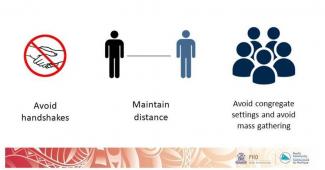
The COVID-19 outbreak has been declared a Pandemic and safety precautions are being taken for this. One such way is through social distancing.
What is social distancing?
Social distancing is a term applied to public health practice to halt or slow down the spread of a highly contagious diseases such as COVID-19 by minimising contact between one individual(s) to others.
Why social distancing is important?
Social distancing is important because COVID-19 is most likely to spread from person-to-person through direct close contact with an infected person who coughs or sneezes, or touches objects or surfaces contaminated with a confirmed infection and then touching your mouth, nose or eyes. So, the more space between you and others, the harder it is for the virus to spread.
Who should practice social distancing?
Everyone should practice social distancing measures in their daily lives to protect themselves and their families and co-workers from COVID-19.
How do I practice social distancing?
1. Maintain distance
- Maintaining at least 1 metre or 3 feet (CDC recommends 2 meters or 6 feet) from one another.
- Avoiding handshakes, hug, kiss etc. with both people with symptoms and people without symptoms as virus can be spread even without symptoms.
2. Avoid congregate settings and avoid mass gathering
On the broader scale, where relevant, there are several actions taken in recent days in different countries to encourage social distancing practices.
- Workplace and businesses setting:
- Cancelling or postponing events including workshops, meetings, conferences etc.
- Encouraging or mandating flexible work options and practices including work from home, telecommuting etc.
- Avoiding unnecessary overseas travels for either business or work
- School setting:
- Suspending childcare centres, schools, universities and converting to remote online study or web-based learning if possible
- Public places:
- Avoiding or minimising the use of public transportation, playgrounds, parks, pubs, supermarkets etc.
- Community setting:
- Cancelling or postponing events such as festivals, parades, sporting etc.
- Suspending services at houses of worship, talanoa or communal gatherings
